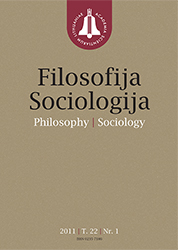The Transformation of Modern Causality in Heidegger’s Thought
The Transformation of Modern Causality in Heidegger’s Thought
Author(s): Nerijus StasiulisSubject(s): Metaphysics, Existentialism, Ontology
Published by: Lietuvos mokslų akademijos leidykla
Keywords: Apriorism; Aristotle; causality; Heidegger; temporality;
Summary/Abstract: The article presents an analysis of the notion of causality in Heideggerian terms. The modern notion of causality presupposes the Cartesian notion of extended space, the principle of sufficient ground (reason), the notion of object as accessible through mathematical description and the notion of linear time. These notions have been critiqued and transformed in Heidegger’s thought on Being as unconcealing. Hence the new possibility of conceiving causality as unconcealing – which presupposes another, non-algebraic, notion of space, a temporalized principle of ground, another notion of constant presence and, last but not least, the notion of ecstatic time. The article demonstrates that Heidegger’s notion of ecstatic time both implies and presupposes the critique and transformation of the modern notion of causality
Journal: Filosofija. Sociologija
- Issue Year: 30/2019
- Issue No: 1
- Page Range: 27-36
- Page Count: 10
- Language: English

